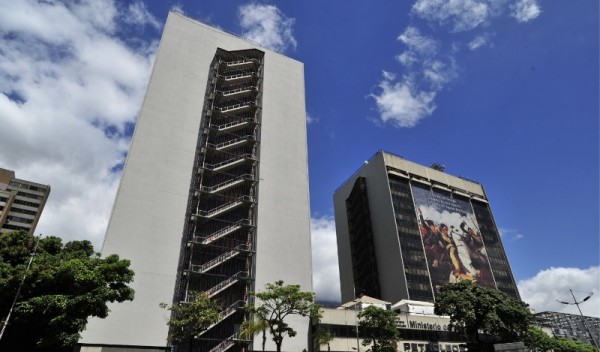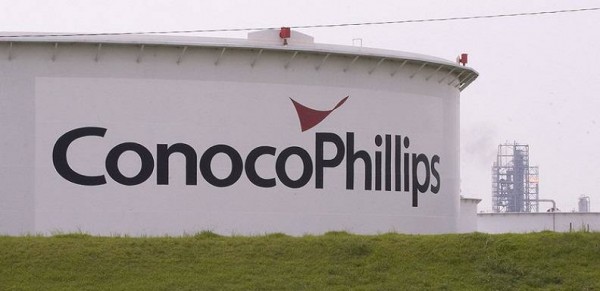Hmmmmmmmmmm.
posted on
Apr 04, 2017 07:28PM

Crystallex International Corporation is a Canadian-based gold company with a successful record of developing and operating gold mines in Venezuela and elsewhere in South America

ConocoPhillips applied to the Delaware District Court for an oral argumentation hearing to address the issues raised by PDV Holding Inc.'s attorneys regarding the lawsuit filed by the company for noncompliance in payment of obligations, and for Pdvsa's attempts To sell its Citgo assets to Rosneft as part of a plan to defraud creditors.
According to the lawsuit filed by ConocoPhillips in US court, Pdvsa would have made a fraudulent transfer of 49.9% of the shares of Citgo Holding Inc. as security for a $ 1.5 million loan that Pdvsa obtained from Rosneft PJSC of Russia, with Which PDVSA would be manipulating its assets in the USA. Not to pay the obligations it has with its creditors.
In October 2016, ConocoPhillips sued Pdvsa for using the other 50.1% of Citgo to support a $ 2.8 billion debt swap. The US firm says the agreement intends to monetize Citgo avoiding to pay reparations to foreign operators for the seizures of Venezuelan oil fields.
In accordance with Local Rule 7.1.4 of the District of Delaware, ConocoPhillips Petrozuata BV, Phillips Petroleum Company Venezuela Limited, ConocoPhillips Gulf of Paria BV and ConocoPhillips Hamaca BV requested the court to set a hearing for an oral argumentation of the Demand by PDV Holding, Inc. The judge has not yet responded to this request.
In the oral argument hearings, the two parties to the dispute go to the judge to assess the legal reasons that should prevail in the complaint. In this particular case, it refers to the fact that PDV Holding argued before the court that it is not a debtor of ConocoPhillips and therefore, can not be sued since there is no obligation between that entity and the US corporation.
The litigation between the parties argues that PDVSA created PDV Holding to manipulate the assets of the Venezuelan state in the US. And thus avoid complying with the mandate of the ICSID that obligates to pay the repairs products of the expropriations made by the government of Hugo Chavez to the assets of the transnational.
ConocoPhillips sued Pdvsa for $ 22 billion after nationalizing its stake in the Orinoco Oil Belt (FPO), in the development of the Petrozuata block, which produces approximately 120,000 barrels a day and has an improver whose investment is 1.3 billion of dollars.
The Arbitral Tribunal of the International Center for Settlement of Investment Disputes (ICSID) ruled on February 9, 2016 in favor of ConocoPhillips and ordered payment of the obligations. In May 2016, PDVSA asked the ICSID to reconsider the decision in favor of the US oil company and requested a hearing on the case, arguing that the court had committed a series of irregularities that allegedly undermine the interests of the Republic.
The Venezuelan state told Ciadi that ConocoPhillips refused to migrate to the sovereign scheme of mixed companies (60% of the shares in Venezuela's hands and 40% to the foreign company) established in Venezuelan laws and that the transnational company rejected its agreement to participate in the FPO blocks in the developments of Petrozuata, La Hamaca and Corocoro (now called Petroanzoategui, PetroPiar and PetroSucre) and decided to proceed legally since 2007.

In February 2017, PDV Holding asked the Delaware Judge that the claim against him be dismissed "for failing to file a rights-based claim." Ensures that ConocoPhillips and the associated companies, did not establish in the claim that PDV Holding is debtor of the plaintiffs.
PDVSA created PDV Holding as a figure to transfer the shares of Citgo Holding to Rosneft Trading, SA which constitutes a fraudulent transfer according to ConocoPhillips. The defendant asserts that under this scheme, PDV Holding has no obligations with Pdvsa's creditors, and therefore is not entitled to a judgment of money against PDVH, since they can not establish the "right to payment" required by the law against That entity.
Likewise, PDV Holding asserts that the alleged basis of the creditor-debtor relationship between plaintiffs and PDVH is not sufficient because the plaintiffs did not file a lawsuit against PDVH.
For its part, ConocoPhillips argues that they do not need to establish a creditor-debtor relationship with PDVH because PDVH can be responsible as a "non-debtor cedent". This argument is rejected by PDVH for which it makes use of what is established in Delaware Uniform Fraudulent Transfer Act (Dufta). According to Dufta, a fraudulent transfer involves the debtor's assets.
PDVH claims that it transferred its own property to Rosneft and as PDVH is not a debtor of ConocoPhillips and the other plaintiffs can not file a fraudulent transfer request against PDVH and therefore requests that such action be dismissed.
"PDVH can not be responsible as a non-debtor cedent" warn the document PDVSA defenders in the case.
ConocoPhillips contends that PDVH may be liable for the Rosneft transaction as a "non-debtor cedent," citing a decision taken in that same court in connection with a case brought by the Canadian transnational Crystallex against PDVH, which is currently On appeal.
PDVH asserts that "ConocoPhillips ignores that a court order or execution of the court order is impracticable in this case," which warns that "there is no possibility that the applicants can achieve economic benefits with the complaint based on the alleged fraudulent transfer of The actions of Citgo to Rosneft. "
They contend that plaintiffs can not claim that PDVH owes them any amount of money as a result of their alleged participation in the alleged transfer fraud or - even - as a result of a possible claim victory based on or established in the interposed Dufta Act By the Claimants.
- The ConocoPhillips lawsuit to obtain a precautionary measure against PDVH does not give rise to a "right to payment", real or nascent, as the statute demands, they warn.
For its part, ConocoPhillips dismisses the arguments put forward by PDVH, in particular that related to the impossibility of claiming through what is established in the Dufta law, according to which, the plaintiffs are not creditors of PDVH.
He states that they are wrong because the action does not depend solely on ConocoPhillips' "creditor" status, but there is jurisprudence that proves that PDVH has responsibility as a "non-debtor cedent" in relation to the Rosneft transaction, as in the Crystallex case .
ConocoPhillips argues that PDVH is a "debtor" due to the contingent liability of the fraudulent transfer of what was left of patrimony of the only asset of the Venezuelan State in the USA. (Citgo Holding) to Rosneft in exchange for no consideration.
ConocoPhillips lawyers, like Crystallex's, say the legal action is also based on the Foreign Sovereign Immunities Act (FSIA) Act. The FSIA can protect sovereign property from pre-trial settlement and may limit the resources ultimately available if Claimants prevail over the fund. The mere prospect of liability for a fraudulent transfer is not an attachment or foreclosure of any property.
On November 30, 2016, ConocoPhillips reported that Pdvsa, PPSA, PDVH and Rosneft had completed the Citgo transaction to Rosneft. Through this transaction, Pdvsa raised US $ 1.5 billion in cash from Rosneft and, in return, caused PDVH to grant Rosneft the pledge of all of its remaining capital in Citgo Holding and forced PPSA to deliver Pdvsa's crude to Rosneft. Pdvsa then transferred the revenue to Venezuela.

The purpose of the PDVH to transfer to Rosneft the total value of the assets held by the Venezuelan State in the United States is intended to hinder, delay or defraud the creditors of the Bolivarian Republic of Venezuela.
In a press release dated December 23, 2016, referring to the 2016 Bond Conversion (Denounced by ConocoPhillips) and the one related to Operation Rosneft, PDVSA explained: "Just as PDVSA was leveraged in October 2016 using as collateral the 50.1 % Of Citgo for the bond swap operation, amid attacks against the company and a decline in the global oil industry, has used the remaining 49.9% of Citgo's capital to obtain new financing.
In that same press release, Pdvsa confirmed its ownership and control over its subsidiaries, including PPSA and PDVH, and even indirect subsidiaries of Citgo, stating: "PDVSA maintains full ownership and control over Citgo Petroleum Corporation, its subsidiary in the U.S".
PDVH could not have committed all of its remaining capital in its sole asset for nothing. The only explanation is that he was acting under the orders and on behalf of PDVSA, which received US $ 1.5 billion from Operation Rosneft to transfer the value of the shares of Citgo that belonged to the Venezuelan State.
What is pending
ConocoPhillips and the other plaintiffs have pending arbitration actions against the Bolivarian Republic of Venezuela, Petróleos de Venezuela, SA and Pdvsa Petróleo, SA ("PPSA"), a subsidiary of Pdvsa. The claims stemmed from the confiscation and nationalization of the applicants' investments in oil and gas projects worth billions of dollars in Venezuela.
Venezuela and PDVSA, along with their Delaware PDVH subsidiaries, Citgo Holding, Inc., Petroleum Corporation Citgo Petroleum, conducted a series of transactions to liquidate and remove assets of Venezuela in the United States in order to hinder, delay or defraud the Applicants. Despite multiple pending lawsuits challenging such transactions, defendants continue to make fraudulent transfers.
PDVH argues that the courts of the United States are powerless to do anything about it.http://www.analitica.com/economia/conocophillips-solicita-a-una-corte-una-audiencia-de-argumentacion-oral-por-caso-pdvh-pdvsa/